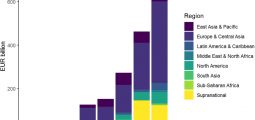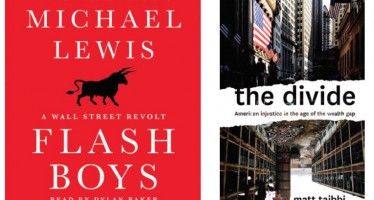Piketty’s Capital: A Problem Analysed In-Depth but not Solved
 When a book on economics cites Honoré de Balzac and Jane Austen to provide evidence, one cannot fail to take note. It sure beats the rather uninspiring conclusion that R > G and this means trouble. The rate of return on capital being greater than the rate of growth of the overall economy has all but a few of us becoming poorer as time goes by.
When a book on economics cites Honoré de Balzac and Jane Austen to provide evidence, one cannot fail to take note. It sure beats the rather uninspiring conclusion that R > G and this means trouble. The rate of return on capital being greater than the rate of growth of the overall economy has all but a few of us becoming poorer as time goes by.
That is the conclusion French economist Thomas Piketty reaches after some 700 pages in his best-selling Capital in the Twenty-First Century. This hefty tome confirms what most people since the days of Robin Hood already suspected – the rich get richer while the poor get poorer. But we had to wait for Mr Piketty to burst onto the scene to find out why this is so.
The cliché just cited is dubbed “the central contradiction of capitalism.” And while Karl Marx came pretty close to deciphering it, his rather verbose and rambling analysis missed the point: Working for a living is financially much less rewarding than marrying into money. It is perhaps why Victorians spent such a great deal of time liaising with distant but wealthy family members or moneyed acquaintances.
Mr Piketty has marshalled an impressive array of historical statistical data to prove that, if left unchecked, capital grows faster than the economy. Over time, the ratio of wealth to income soars. This cycle is only interrupted by events of a catastrophic nature such as world wars, pandemics, and revolution. It explains why social disparities in post-war Europe and North America were much smaller than they are today.
Some economists – undoubtedly a tiny bit envious of Mr Piketty’s near-rock star status – argue that his book is but an extended “duhh” moment: “Of course capital accumulates faster than the economy grows. That’s noncontroversial and reflects merely the reward for delayed gratification. People who save and invest rather than spend expect to be rewarded. Since the future is uncertain, their reward should be significant,” says Scott Winship of the Manhattan Institute.
Rather than pleading for an apocalyptic conflagration, Mr Piketty’s answer to the capitalism’s central contradiction is the introduction of a global tax on wealth. The global nature of such a burden on outsized fortunes means that the über-wealthy can no longer take their money and run for cover. Though many countries have dabbled in wealth taxes, most have desisted of the idea.
Mr Piketty’s global wealth tax proposal has as much chance of survival as the proverbial snowball in hell. It represents the weak spot of his book and of his reasoning. Apart from the fact that it is well-neigh impossible to have all countries in the world agree to such a scheme, taxes on wealth tend to accomplish little.
Also, what is to be done with the monies thus raised? Are these funds to be allotted to poor countries so they get a free ride to prosperity? Are free lunches to be called into existence, and if so, does that not send the wrong signal by rewarding incompetence and/or inefficiency?
Mr Piketty’s book is a lot stronger when it comes to analysing the consequences of unrestrained wealth accumulation. It may cause societies to become less equal, less socially mobile, and even less democratic. US President Barack Obama recently called inequality “the defining challenge of our time.” The book’s US release followed in the wake of the Occupy Wall Street movement that expressed the growing popular concern about the one-percenters claiming all the wealth leaving the rest of society to face an impoverished future.
Mr Piketty argues that the concentration of wealth will inevitably lead to social and economic upheaval. He concludes that the world is returning toward “patrimonial capitalism” dominated by an oligarchy backed up by inherited wealth. To illustrate this point, Mr Piketty appeals to literary greats such as Honoré de Balzac, Jane Austen, and Henry James who vividly described life in the 1800s when societies were rigidly organised along class lines determined by wealth.
Should the progressive concentration of wealth be left unchecked, Mr Piketty predicts that economic growth will suffer severely. Though not a Luddite, he dismisses the notion that advances in technology will provide the impetus for future growth spurs.
To avoid a bleak world of a few haves and a great many have-nots, Mr Piketty pleads not just for the introduction of a global wealth tax of 2%, but also proposes to increase income tax ceilings to 80% or more. Only draconian measures such as these can, over time, reduce wealth inequalities.
Though rather impractical given the current political climate, Mr Piketty’s radical solution to the problem he tabled is not without historical precedent. It is only since the late 1980s that top tax brackets have come down and it is precisely since then that inequality has soared. The causality is debatable, but the existence of the problem may not be denied.
You may have an interest in also reading…
Customer Commandments and Importance of the ‘R’ in CSR: Ignore this at your Peril
The Ethical Business Book by Sarah Duncan Reviewed by John Foot Sarah Duncan is to be congratulated on producing The
A Sojourn in Davos: Things Will Never Be the Same
Book Review – The Magic Mountain by Thomas Mann For all its potential as a canvas for the display of
Book Review: Squeezing Cash Out of Milliseconds
Time is money. To high-frequency traders, it means big money. HFTs make cash by being milliseconds faster than the other




























































































